清明节英文介绍
- 格式:doc
- 大小:20.00 KB
- 文档页数:4
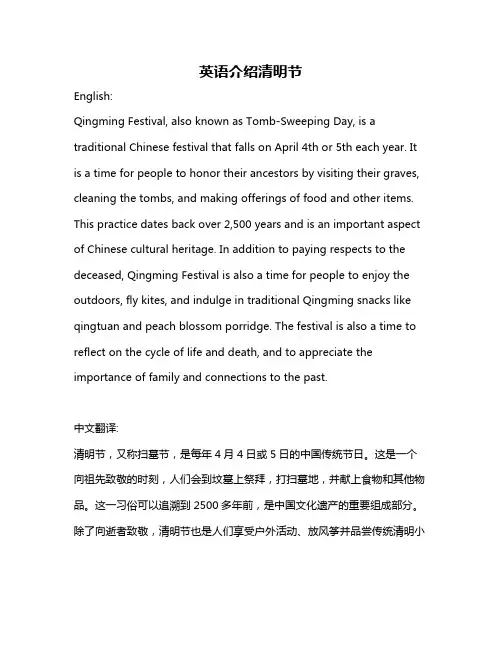
英语介绍清明节English:Qingming Festival, also known as Tomb-Sweeping Day, is a traditional Chinese festival that falls on April 4th or 5th each year. It is a time for people to honor their ancestors by visiting their graves, cleaning the tombs, and making offerings of food and other items. This practice dates back over 2,500 years and is an important aspect of Chinese cultural heritage. In addition to paying respects to the deceased, Qingming Festival is also a time for people to enjoy the outdoors, fly kites, and indulge in traditional Qingming snacks like qingtuan and peach blossom porridge. The festival is also a time to reflect on the cycle of life and death, and to appreciate the importance of family and connections to the past.中文翻译:清明节,又称扫墓节,是每年4月4日或5日的中国传统节日。
这是一个向祖先致敬的时刻,人们会到坟墓上祭拜,打扫墓地,并献上食物和其他物品。
这一习俗可以追溯到2500多年前,是中国文化遗产的重要组成部分。
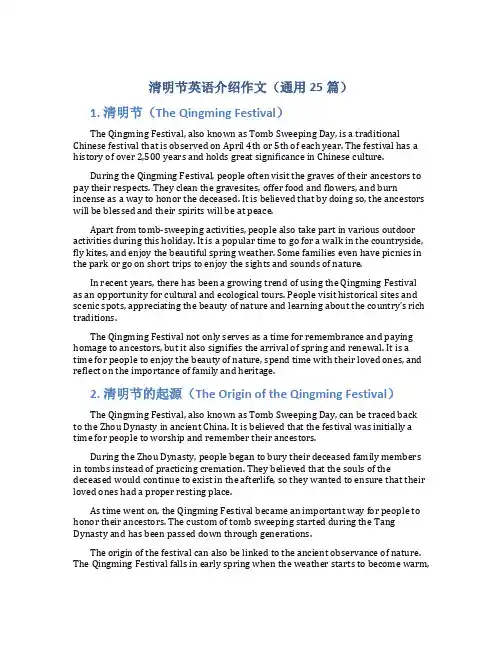
清明节英语介绍作文(通用25篇)1. 清明节(The Qingming Festival)The Qingming Festival, also known as Tomb Sweeping Day, is a traditional Chinese festival that is observed on April 4th or 5th of each year. The festival has a history of over 2,500 years and holds great significance in Chinese culture.During the Qingming Festival, people often visit the graves of their ancestors to pay their respects. They clean the gravesites, offer food and flowers, and burn incense as a way to honor the deceased. It is believed that by doing so, the ancestors will be blessed and their spirits will be at peace.Apart from tomb-sweeping activities, people also take part in various outdoor activities during this holiday. It is a popular time to go for a walk in the countryside, fly kites, and enjoy the beautiful spring weather. Some families even have picnics in the park or go on short trips to enjoy the sights and sounds of nature.In recent years, there has been a growing trend of using the Qingming Festival as an opportunity for cultural and ecological tours. People visit historical sites and scenic spots, appreciating the beauty of nature and learning about the country’s rich traditions.The Qingming Festival not only serves as a time for remembrance and paying homage to ancestors, but it also signifies the arrival of spring and renewal. It is a time for people to enjoy the beauty of nature, spend time with their loved ones, and reflect on the importance of family and heritage.2. 清明节的起源(The Origin of the Qingming Festival)The Qingming Festival, also known as Tomb Sweeping Day, can be traced backto the Zhou Dynasty in ancient China. It is believed that the festival was initially a time for people to worship and remember their ancestors.During the Zhou Dynasty, people began to bury their deceased family members in tombs instead of practicing cremation. They believed that the souls of the deceased would continue to exist in the afterlife, so they wanted to ensure that their loved ones had a proper resting place.As time went on, the Qingming Festival became an important way for people to honor their ancestors. The custom of tomb sweeping started during the Tang Dynasty and has been passed down through generations.The origin of the festival can also be linked to the ancient observance of nature. The Qingming Festival falls in early spring when the weather starts to become warm,and nature begins to revive. People took this opportunity to go outside and appreciate the beauty of the blooming flowers, fly kites, and enjoy outdoor activities.3. 清明节的习俗(Customs of the Qingming Festival)The Qingming Festival is a time when people engage in a variety of customs to honor their ancestors and enjoy the arrival of spring. Here are some common customs associated with this traditional Chinese festival:3.1 Tomb SweepingTomb Sweeping is the most significant custom during the Qingming Festival. People visit the graves of their ancestors to offer tributes, clean the gravesites, and burn incense. It is believed that by doing so, the spirits of the deceased will be at peace and ancestors will bless their descendants.3.2 Spring OutingsSpring outings are a popular activity during the Qingming Festival. This is a time when people take advantage of the pleasant weather and go outside to enjoy the beauty of nature. They often visit parks, gardens, or countryside areas to appreciate the blooming flowers, go for walks, and have picnics with family and friends.3.3 Flying KitesFlying kites is another traditional activity during the Qingming Festival. It is believed that kite flying can bring good luck and drive away evil spirits. People of all ages take part in this activity, with colorful kites filling the sky and adding to the festive atmosphere.3.4 Eating Qingming CakesQingming cakes, also known as green rice balls or pure-bright pastries, are a special treat during this festival. They are made using glutinous rice and different fillings such as red bean paste or nut mixtures. These cakes are eaten to symbolize the arrival of spring and the bright future ahead.These are just a few examples of the customs associated with the Qingming Festival. Each region in China may have its unique customs and traditions, but the underlying spirit of remembrance, respect, and celebration is shared nationwide.4. 清明节的重要意义(The Significance of the Qingming Festival)The Qingming Festival holds great importance in Chinese culture and has several significant meanings. Here are a few key reasons why the festival is celebrated and cherished:4.1 RemembranceFirst and foremost, the Qingming Festival is a time for people to remember and honor their ancestors. By visiting their graves, cleaning the tombstones, and making offerings, people show their respect and gratitude towards their deceased loved ones.4.2 Connection to NatureThe Qingming Festival also serves as a reminder of the connection between humans and nature. As the festival falls in early spring, it is a time when nature starts to come alive, and the weather becomes warmer. People take this opportunity to appreciate the beauty of nature, go for outings, and enjoy outdoor activities.4.3 Family ReunionThe Qingming Festival is a time for families to come together and spend quality time with one another. Many people take advantage of the holiday to travel back to their hometowns and visit their relatives. It is seen as a time for family reunion and strengthening family bonds.4.4 Cultural HeritageThe Qingming Festival is deeply rooted in Chinese history and traditions. It provides an opportunity for people to learn about and pass down their cultural heritage to the younger generation. Through the customs and activities associated with the festival, people gain a deeper understanding of their roots and the importance of preserving their traditions.The Qingming Festival is more than just a holiday; it is a time for reflection, reverence, and renewal. It brings together people from all walks of life to pay respect to ancestors, appreciate nature, and cherish the importance of family and cultural heritage.。
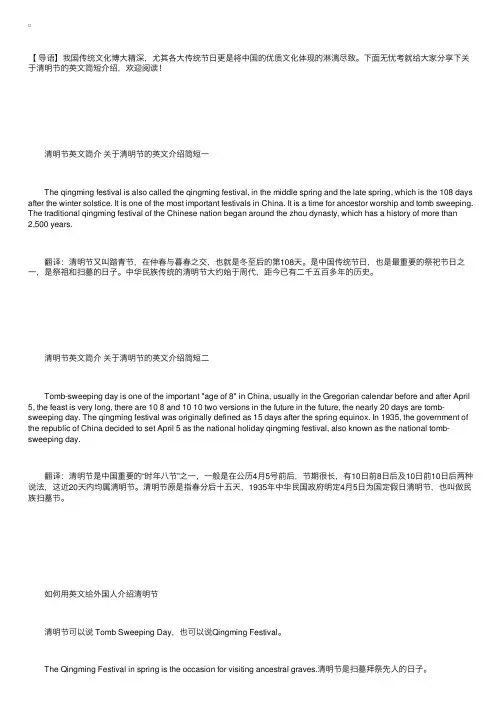
【导语】我国传统⽂化博⼤精深,尤其各⼤传统节⽇更是将中国的优质⽂化体现的淋漓尽致。
下⾯⽆忧考就给⼤家分享下关于清明节的英⽂简短介绍,欢迎阅读! 清明节英⽂简介关于清明节的英⽂介绍简短⼀ The qingming festival is also called the qingming festival, in the middle spring and the late spring, which is the 108 days after the winter solstice. It is one of the most important festivals in China. It is a time for ancestor worship and tomb sweeping. The traditional qingming festival of the Chinese nation began around the zhou dynasty, which has a history of more than 2,500 years. 翻译:清明节⼜叫踏青节,在仲春与暮春之交,也就是冬⾄后的第108天。
是中国传统节⽇,也是最重要的祭祀节⽇之⼀,是祭祖和扫墓的⽇⼦。
中华民族传统的清明节⼤约始于周代,距今已有⼆千五百多年的历史。
清明节英⽂简介关于清明节的英⽂介绍简短⼆ Tomb-sweeping day is one of the important "age of 8" in China, usually in the Gregorian calendar before and after April 5, the feast is very long, there are 10 8 and 10 10 two versions in the future in the future, the nearly 20 days are tomb-sweeping day. The qingming festival was originally defined as 15 days after the spring equinox. In 1935, the government of the republic of China decided to set April 5 as the national holiday qingming festival, also known as the national tomb-sweeping day. 翻译:清明节是中国重要的“时年⼋节”之⼀,⼀般是在公历4⽉5号前后,节期很长,有10⽇前8⽇后及10⽇前10⽇后两种说法,这近20天内均属清明节。
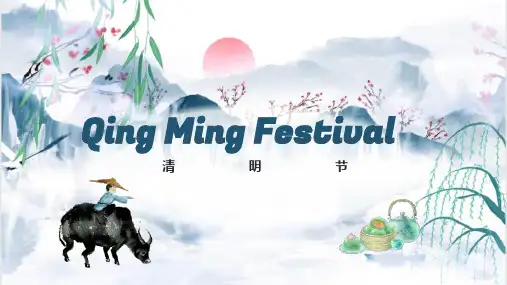
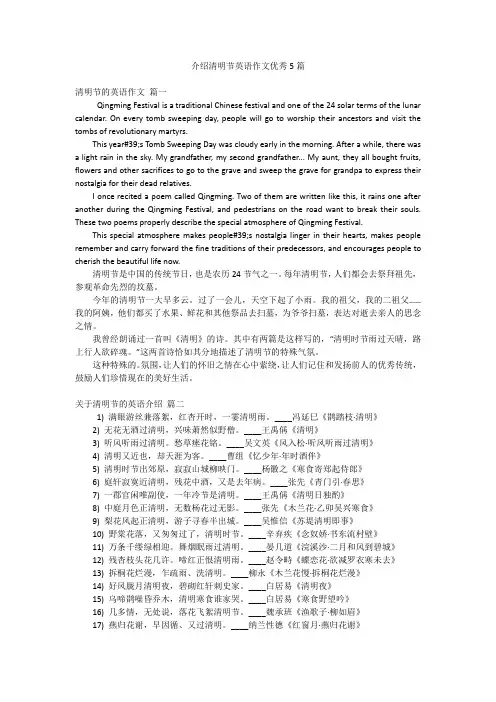
介绍清明节英语作文优秀5篇清明节的英语作文篇一Qingming Festival is a traditional Chinese festival and one of the 24 solar terms of the lunar calendar. On every tomb sweeping day, people will go to worship their ancestors and visit the tombs of revolutionary martyrs.This year#39;s Tomb Sweeping Day was cloudy early in the morning. After a while, there was a light rain in the sky. My grandfather, my second grandfather... My aunt, they all bought fruits, flowers and other sacrifices to go to the grave and sweep the grave for grandpa to express their nostalgia for their dead relatives.I once recited a poem called Qingming. Two of them are written like this, it rains one after another during the Qingming Festival, and pedestrians on the road want to break their souls. These two poems properly describe the special atmosphere of Qingming Festival.This special atmosphere makes people#39;s nostalgia linger in their hearts, makes people remember and carry forward the fine traditions of their predecessors, and encourages people to cherish the beautiful life now.清明节是中国的传统节日,也是农历24节气之一。

清明节英语简介篇一:清明节英文介绍清明节英文介绍awell-knownpoembyTangdynastywriterdumutellsofasadsceneinearlyapril:”rainsfallheavilyasQingmingcomes,andpassers-bywithloweredspiritsgo.”Qingmingday,thetraditionaltomb-sweepingday,fallsonapril4-6eachyear.iti satimeforrememberinglovedoneswhohavedeparted.Peoplevisittheirancest ors'gravestosweepawaythedirt.唐朝著名诗人杜牧有一首著名的诗,描述了四月初令人伤感的一幕场景:“清明时节雨纷纷,路上行人欲断魂。
”每年4月4-6日左右的清明节是传统的扫墓的日子。
在这一天,人们祭吊去世的亲人,到先人的坟头上扫墓。
itsorigindatesbacktotheSpringandautumnPeriod.Jinprincechong'erra nawayfromthecountrywithhissupportersduetopersecution.Theywerehomelessfor19yearsandthingsgotsobadthatchong&# 39;erbegantostarvetodeath.oneoftheprince'sfaithfulfollowers,Jiezitui ,cutapieceofmusclefromhisownlegandservedittohismaster.chong'erwassavedand,in636Bc,hetookbackthethrone.清明节可以追溯到春秋时代。
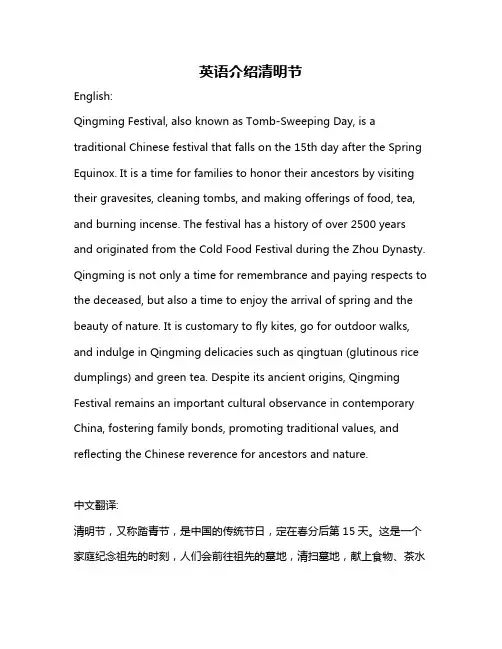
英语介绍清明节English:Qingming Festival, also known as Tomb-Sweeping Day, is a traditional Chinese festival that falls on the 15th day after the Spring Equinox. It is a time for families to honor their ancestors by visiting their gravesites, cleaning tombs, and making offerings of food, tea, and burning incense. The festival has a history of over 2500 years and originated from the Cold Food Festival during the Zhou Dynasty. Qingming is not only a time for remembrance and paying respects to the deceased, but also a time to enjoy the arrival of spring and the beauty of nature. It is customary to fly kites, go for outdoor walks, and indulge in Qingming delicacies such as qingtuan (glutinous rice dumplings) and green tea. Despite its ancient origins, Qingming Festival remains an important cultural observance in contemporary China, fostering family bonds, promoting traditional values, and reflecting the Chinese reverence for ancestors and nature.中文翻译:清明节,又称踏青节,是中国的传统节日,定在春分后第15天。
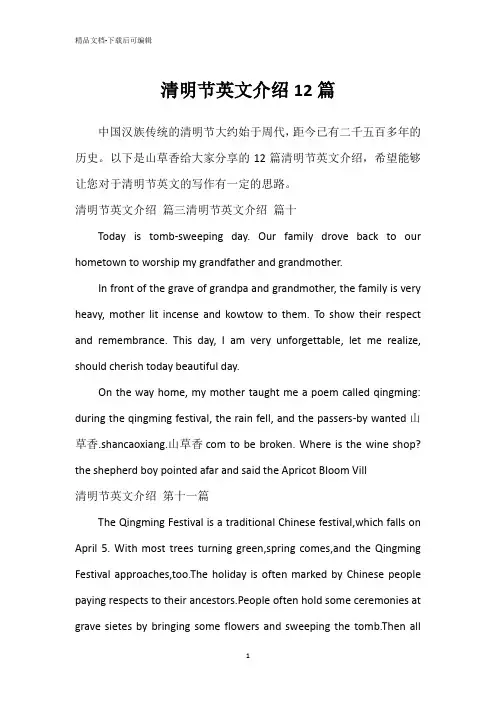
清明节英文介绍12篇中国汉族传统的清明节大约始于周代,距今已有二千五百多年的历史。
以下是山草香给大家分享的12篇清明节英文介绍,希望能够让您对于清明节英文的写作有一定的思路。
清明节英文介绍篇三清明节英文介绍篇十Today is tomb-sweeping day. Our family drove back to our hometown to worship my grandfather and grandmother.In front of the grave of grandpa and grandmother, the family is very heavy, mother lit incense and kowtow to them. To show their respect and remembrance. This day, I am very unforgettable, let me realize, should cherish today beautiful day.On the way home, my mother taught me a poem called qingming: during the qingming festival, the rain fell, and the passers-by wanted山草香.shancaoxiang.山草香com to be broken. Where is the wine shop? the shepherd boy pointed afar and said the Apricot Bloom Vill清明节英文介绍第十一篇The Qingming Festival is a traditional Chinese festival,which falls on April 5. With most trees turning green,spring comes,and the Qingming Festival approaches,too.The holiday is often marked by Chinese people paying respects to their ancestors.People often hold some ceremonies at grave sietes by bringing some flowers and sweeping the tomb.Then allthe familly members sit together to talk about the family history and share traditional meals. The Qingming Festival gives all of us an opportunity to show gratitude to our ancestors.It is because of their achievements that we have a happy life today.清明节英文介绍第十二篇On the day of tomb-sweeping day, grandfather, uncle and uncle, they went to sweep the grave together, but I did not go. I think: they should visit the grave.On their way, there should be a lot of beautiful and beautiful flowers, green grass and, of course, the high and green hillside, beautiful!I thought: what should they bring? Should they go and bow to grandpas mother?I didnt go to the grave, but I was curious to know how the grandfathers mother looked, was there a kind heart, or did not?书中自有黄金屋,书中自有颜如玉。
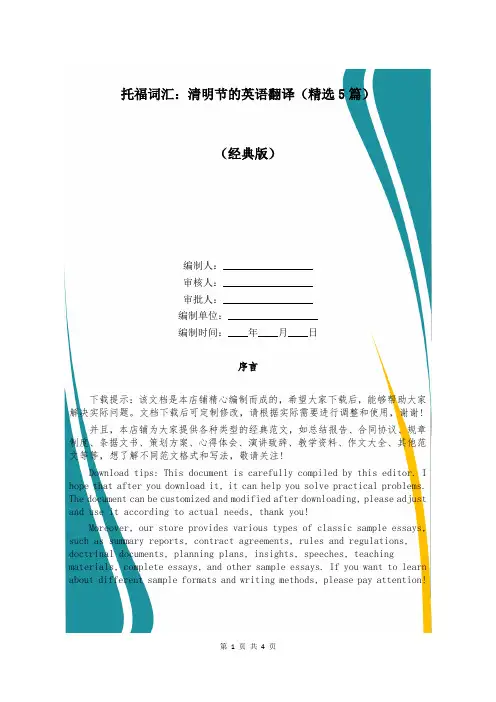
托福词汇:清明节的英语翻译(精选5篇)(经典版)编制人:__________________审核人:__________________审批人:__________________编制单位:__________________编制时间:____年____月____日序言下载提示:该文档是本店铺精心编制而成的,希望大家下载后,能够帮助大家解决实际问题。
文档下载后可定制修改,请根据实际需要进行调整和使用,谢谢!并且,本店铺为大家提供各种类型的经典范文,如总结报告、合同协议、规章制度、条据文书、策划方案、心得体会、演讲致辞、教学资料、作文大全、其他范文等等,想了解不同范文格式和写法,敬请关注!Download tips: This document is carefully compiled by this editor. I hope that after you download it, it can help you solve practical problems. The document can be customized and modified after downloading, please adjust and use it according to actual needs, thank you!Moreover, our store provides various types of classic sample essays, such as summary reports, contract agreements, rules and regulations, doctrinal documents, planning plans, insights, speeches, teaching materials, complete essays, and other sample essays. If you want to learn about different sample formats and writing methods, please pay attention!托福词汇:清明节的英语翻译(精选5篇)清明节又称踏青节、行清节、三月节、祭祖节等,是中华民族传统的重大春祭节日,属于慎终追远、礼敬祖先、弘扬孝道的一种文化传统节日。
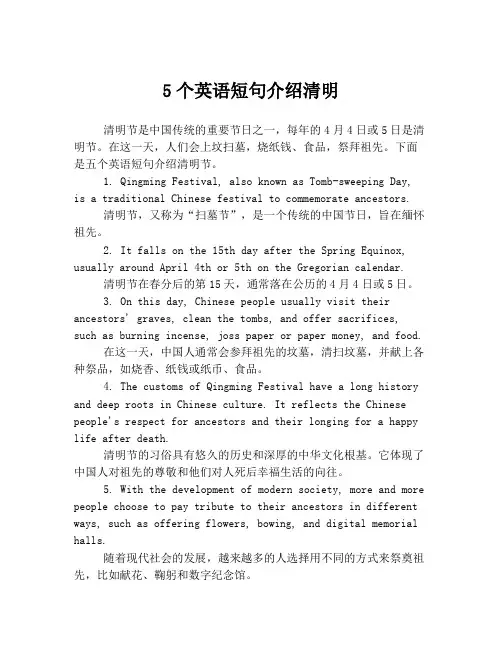
5个英语短句介绍清明清明节是中国传统的重要节日之一,每年的4月4日或5日是清明节。
在这一天,人们会上坟扫墓,烧纸钱、食品,祭拜祖先。
下面是五个英语短句介绍清明节。
1. Qingming Festival, also known as Tomb-sweeping Day, is a traditional Chinese festival to commemorate ancestors.清明节,又称为“扫墓节”,是一个传统的中国节日,旨在缅怀祖先。
2. It falls on the 15th day after the Spring Equinox, usually around April 4th or 5th on the Gregorian calendar.清明节在春分后的第15天,通常落在公历的4月4日或5日。
3. On this day, Chinese people usually visit their ancestors' graves, clean the tombs, and offer sacrifices, such as burning incense, joss paper or paper money, and food.在这一天,中国人通常会参拜祖先的坟墓,清扫坟墓,并献上各种祭品,如烧香、纸钱或纸币、食品。
4. The customs of Qingming Festival have a long history and deep roots in Chinese culture. It reflects the Chinese people's respect for ancestors and their longing for a happy life after death.清明节的习俗具有悠久的历史和深厚的中华文化根基。
它体现了中国人对祖先的尊敬和他们对人死后幸福生活的向往。
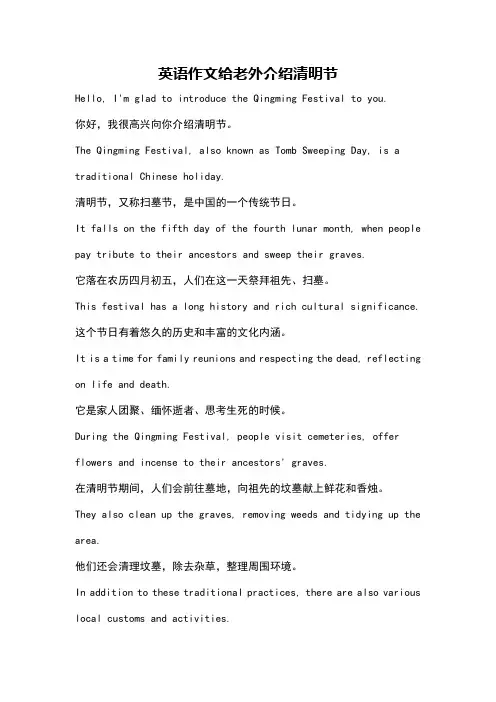
英语作文给老外介绍清明节Hello, I'm glad to introduce the Qingming Festival to you.你好,我很高兴向你介绍清明节。
The Qingming Festival, also known as Tomb Sweeping Day, is a traditional Chinese holiday.清明节,又称扫墓节,是中国的一个传统节日。
It falls on the fifth day of the fourth lunar month, when people pay tribute to their ancestors and sweep their graves.它落在农历四月初五,人们在这一天祭拜祖先、扫墓。
This festival has a long history and rich cultural significance. 这个节日有着悠久的历史和丰富的文化内涵。
It is a time for family reunions and respecting the dead, reflecting on life and death.它是家人团聚、缅怀逝者、思考生死的时候。
During the Qingming Festival, people visit cemeteries, offer flowers and incense to their ancestors' graves.在清明节期间,人们会前往墓地,向祖先的坟墓献上鲜花和香烛。
They also clean up the graves, removing weeds and tidying up the area.他们还会清理坟墓,除去杂草,整理周围环境。
In addition to these traditional practices, there are also various local customs and activities.除了这些传统习俗外,各地还有丰富多彩的民间风俗和活动。
清明节是我国的传统节日英语作文英文回答:Qingming Festival, or Tomb-Sweeping Day, is one of the most important traditional festivals in China. It is a time to honor and remember our deceased loved ones by visiting their gravesites, cleaning them, and offering food and prayers.The festival falls on the 15th day of the third month of the Chinese lunar calendar, which usually occurs in April. In 2023, Qingming Festival will be observed on April 5th.The origins of Qingming Festival can be traced back to ancient China, over 2,500 years ago. It is believed that the festival began as a day to worship ancestors and pray for good harvests. Over time, it evolved into a day to commemorate all deceased loved ones.Qingming Festival is a time for families to come together and remember their ancestors. It is also a time to reflect on the cycle of life and death, and to appreciate the importance of family and loved ones.中文回答:清明节是我国的传统节日,也是扫墓祭祖的日子。
介绍清明节的英文作文介绍清明节的英文作文清明节又叫踏青节,在仲春与暮春之交,也就是冬至后的第108天。
是中国传统节日,也是最重要的祭祀节日之一,是祭祖和扫墓的日子。
下面是小编为大家收集关于介绍清明节的英文作文,欢迎借鉴参考。
清明节英语作文篇一:Last Qingming Festival,i return home to worship my grandfather.Qingming Festival is a folk Festival.In the past,In the past, the Qingming Festival was called Arbor Day. But Today, Chinese visit their family graves to tend to any underbrush that has grown. Weeds are pulled, and dirt swept away, and the family will set out offerings of food and spirit money. Unlike the sacrifices at a family's home altar, the offerings at the tomb usually consist of dry, bland food. One theory is that since any number of ghosts rome around a grave area, the less appealing food will be consumed by the ancestors, and not be plundered by strangers.With the passing of time, this celebration of life became a day to the honor past ancestors. Following folk religion, the Chinese believed that the spirits of deceased ancestors looked after the family. Sacrifices of food and spirit money could keep them happy, and the family would prosper through good harvests and more children.清明节英语作文篇二:The Qingming (Pure Brightness) Festival is one of the 24 solar terms in China, falling on April 4-6 each year. After the festival, the temperature will rise up and rainfall increase. It is the high time for spring plowing and sowing. In the past, the Qingming Festival was called “Arbor Day”, but since 1979, “Arbor Day” was settled on March 12 according to the Gregorian calendar.清明节是我国24节气之一,在每年农历的4月4-6之间。
介绍清明节的英语作文介绍清明节的英语作文(通用25篇)导语:清明节是中国传统的节日,有两千五百年的历史;以下是小编为大家整理的介绍清明节的英语作文,欢迎阅读与收藏。
介绍清明节的英语作文篇1The Qingming Festival is one of the twenty-four solar term, in the spring and late spring at the turn, which is 108 days after the winter solstice. Chinese traditional Qingming Festival began about Zhou Dai, more than 2500 years of history. "Almanac": "after the spring equinox fifteen, refers to the Big Dipper Ding, Ching Ming, when all things are clean and clear, cover when gas Qing Ming, all show, hence the name." Qingming, temperatures, it is plowing season, it is "before and after the Ching Ming, the beans Jhonggua point". The Qingming Festival is a festival of ancestor worship, traditional activities of the grave. In May 20, 2006, with the approval of the State Council included in the first batch of national intangible cultural heritage list清明节是农历二十四节气之一,在仲春与暮春之交,也就是冬至后的108天。
有关清明节介绍英文版The Essence of Qingming Festival.The Qingming Festival, deeply rooted in Chinese culture, is a time of remembrance and respect. It falls on the 106th day after the Winter Solstice, marking the transition from early spring to late spring. This festival embodies the harmonious union of nature and humanity, reflecting the ancient Chinese philosophy of harmony with nature and the universe.At the heart of Qingming is the custom of tomb-sweeping, a ritual that embodies reverence for ancestors and a senseof duty towards one's kin. This tradition is deeply ingrained in Chinese culture, symbolizing respect, filial piety, and the continuation of family lineage. On this day, families gather to clean the tombs of their ancestors, removing any debris that has accumulated over time. Theyalso offer incense, paper money, and other offerings, in a show of respect and gratitude. This act of tidying up notonly serves as a physical reminder of their ancestors but also serves as a symbolic gesture of keeping their memories alive.The Qingming Festival is also a time for outdoor activities, such as hiking, picnicking, and enjoying the beauty of nature. This is because it coincides with the blooming of flowers and the germination of new life, making it a particularly auspicious time for outdoor activities. People often visit scenic spots, appreciate the scenery, and engage in physical exercise to invigorate their bodies and minds.The festival also has a deep cultural significance. It is a time for reflection and introspection, a chance to appreciate the cycles of life and death and to embrace the transience of existence. The Qingming poems of ancient Chinese literati, such as Du Mu's "Raining on Qingming Day," express profound sentiments of sorrow, longing, and the beauty of nature during this time.Moreover, Qingming Festival is a testament to theancient Chinese belief in the interconnectedness of all things. It is a reminder that every life, whether human or otherwise, is part of a larger cosmic cycle. By honoring the dead and celebrating the new life that springs forth, the Chinese people pay tribute to the continuous flow of life and death, a cycle that is both inevitable and beautiful.In conclusion, the Qingming Festival is a rich cultural heritage that embodies the essence of Chinese culture. It is a time for remembrance, reflection, and celebration, a time to honor the past while embracing the future. Through the practices of tomb-sweeping and outdoor activities, the Chinese people pay tribute to their ancestors, appreciate the beauty of nature, and embrace the cycles of life and death. This festival, therefore, serves as a powerful reminder of the harmonious union between nature, humanity, and the universe.。
关于清明节的英文文章
English:
The Qingming Festival, also known as Tomb-Sweeping Day, is a traditional Chinese festival that falls on the 15th day after the Spring Equinox. During this festival, people pay respects to their ancestors by cleaning the tombs and offering them food, tea, and other necessities. It is also a time to enjoy the spring weather and spend time with family by going on outings and flying kites. In recent years, the festival has also become a time to cherish nature and promote environmental protection, as people use this time to plant trees and clean up the surroundings of the tombs.
中文翻译:
清明节,又称踏青节,是中国的传统节日,日期在春分后的第15天。
在这个节日里,人们通过清理祖坟和献上食物、茶和其他日常用品来尊敬祖先。
这也是一个享受春天天气、和家人出游放风筝的时候。
近年来,清明节也逐渐成为珍惜自然、倡导环保的时刻,人们利用这个时间种树和清理祖坟周围的环境。
清明节的由来英语介绍清明节的由来英语介绍清明节是农历二十四节气之一,在仲春与暮春之交,也就是冬至后的.108天,以下是小编整理的关于清明节的由来英语介绍,欢迎阅读。
Qingming Festival, also known as Pure Brightness Festival or Tomb-sweeping Day, is one of the 24 segments of the Chinese calendar. It normally falls on the 4th or 5th of April, between the spring plowing and summer weeding, and is a time to pay respects to one's ancestors and to tidy their gravesite. On this day, whole families, young and old, go to the gravesite of deceased family members to burn incense and perform a ritual offering while clearing away plant overgrowth from the gravesite.Qingming Festival is when Chinese people visit the graves or burial the grounds of their ancestors. Traditionally, people brought a whole rooster with them to the graves visited but the occasion has become less formal over time. The festival originated from Hanshi Day (寒食节, literally, Day with cold food only), a memorial day for Jie Zitui (介子推). Jie Zitui died in 636 BC in the Spring and Autumn Period. He was one of many followers of Duke Wen of Jin before he became a duke. Once, during Wen's 19 years of exile, they had no food and Jie prepared some meat soup for Wen. Wen enjoyed it a lot and wondered where Jie had obtained the soup. It turned out Jie had cut a piece of meat from his own thigh to make the soup. Wen was so moved he promised to reward him one day. However, Jie was not the type of person who sought rewards. Instead, he just the wanted to help Wen to return to Jin to become king. Once Wen became duke, Jie resigned and stayed away from him. Duke Wenrewarded the people who helped him in the decades, but for some reason he forgot to reward Jie, who by then had moved into the forest with his mother. Duke Wen went to the forest, but could not find Jie. Heeding suggestions from his officials, Duke Wen ordered men to set the forest on fire to force out Jie. However, Jie died in the fire. Feeling remorseful, Duke Wen ordered three days without fire to honour Jie's memory. The county where Jie died is still called Jiexiu (介休, literally "the place Jie rests forever").。
清明节英文介绍A well-known poem by Tang Dynasty writer Du Mu tells of a sad scene in early April: "rains fall heavily as Qingming comes, and passers-by with lowered spirits go." Qingming Day, the traditional tomb-sweeping day, falls on April 4-6 each year. It is a time for remembering loved ones who have departed. People visit their ancestors' graves to sweep awaythe dirt.唐朝著名诗人杜牧有一首著名的诗,描述了四月初令人伤感的一幕场景:“清明时节雨纷纷,路上行人欲断魂。
”每年4月4-6日左右的清明节是传统的扫墓的日子。
在这一天,人们祭吊去世的亲人,到先人的坟头上扫墓。
Its origin dates back to the Spring and Autumn Period. Jin prince Chong'erran away from the country with his supporters due to persecution. They were homeless for 19 years and things got so bad that Chong'er began to starve to death. One of the prince's faithful followers, Jie Zitui, cuta piece of muscle from his own leg and served it to his master. Chong'er was saved and, in 636 BC, he took back the throne. 清明节可以追溯到春秋时代。
晋国公子重耳因受到迫害,率其支持者出逃。
19年间,他们居无定所,漂泊四方。
一次,他们的处境相当窘迫,重耳饿得快不行了。
这时,忠心耿耿的介子推从自己的腿上割下一块肉献给了重耳,公子重耳得救了。
公元前636年,他夺回了王位。
He rewarded the officials who had stayed loyal to him but he forgot aboutJie Zitui. By the time Chong'er remembered him, a heartbroken Jie Zituihad traveled deep into the mountains. Chong'er wanted to persuade Jieto come home, so he had the hills set on fire. But Jie was later found beside a large tree, with his old mother on his back. Both were dead. 即位之后,重耳对支持者大加封赏,却忘记了介子退。
等到想起这位忠臣时,伤心的介子推早已遁入山林深处。
重耳想逼他回来,所以就大火焚山。
后来,在一棵大树旁边发现了背着老母的介子推。
两人都被烧死了。
Saddened by the tragedy, Chong'er ordered that fires could not be liton the day of Jie Zitui's death. From this comes Hanshi Day, or Cold Food Day. People visited Jie Zitui's tomb the next day to pay their respects. Over time, Hanshi Day was replaced with tomb-sweeping day. 重耳悲痛欲绝。
他下令,在介子推的忌日不准生火。
寒食节即来源于此。
寒食节的次日,人们到介子推的坟头上致敬。
随着时间的推移,寒食Tomb-sweeping Day 清明节英文介绍Tomb-sweeping Day是最常用的Pure Bright Festival 清明节另外的说法:Qingming Festival(清明节英语介绍)The Qingming (Pure Brightness) Festival is one of the 24 seasonal division points in China, falling on April 4-6 each year. After the festival, the temperature will rise up and rainfall increases. It is the high time for spring plowing and sowing. But the Qingming Festival is not only a seasonal point to guide farm work, it is more a festival of commemoration.The Qingming Festival sees a combination of sadness and happiness.This is the most important day of sacrifice. Both the Han and minority ethnic groups at this time offer sacrifices to their ancestors and sweep the tombs of the diseased. Also, they will not cook on this day and only cold food is served.The Hanshi (Cold Food) Festival was usually one day before the Qingming Festival. As our ancestors often extended the day to the Qingming, they were later combined.On each Qingming Festival, all cemeteries are crowded with people who came to sweep tombs and offer sacrifices. Traffic on the way to the cemeteries becomes extremely jammed. The customs have been greatly simplified today. After slightly sweeping the tombs, people offer food, flowers and favorites of the dead, then burn incense and paper money and bow before the memorial tablet.In contrast to the sadness of the tomb sweepers, people also enjoy hope of Spring on this day. The Qingming Festival is a time when the sun shines brightly, the trees and grass become green and nature is again lively. Since ancient times, people have followed the custom of Spring outings. At this time tourists are everywhere.People love to fly kites during the Qingming Festival. Kite flyingis actually not limited to the Qingming Festival. Its uniqueness lies in that people fly kites not during the day, but also at night. A string of little lanterns tied onto the kite or the thread look like shining stars, and therefore, are called "god's lanterns."The Qingming Festival is also a time to plant trees, for the survival rate of saplings is high and trees grow fast later. In the past, the Qingming Festival was called "Arbor Day". But since 1979, "Arbor Day" was settled as March 12 according to the Gregorian calendar.清明节清明是我国的二十四节气之一。
由于二十四节气比较客观地反映了一年四季气温、降雨、物候等方面的变化,所以古代劳动人民用它安排农事活动。
但是,清明作为节日,与纯粹的节气又有所不同。
节气是我国物候变化、时令顺序的标志,而节日则包含着一定的风俗活动和某种纪念意义。
因此,这个节日中既有祭扫新坟生别死离的悲酸泪,又有踏青游玩的欢笑声,是一个富有特色的节日。
清明节是我国传统节日,也是最重要的祭祀节日,是祭祖和扫墓的日子。
扫墓俗称上坟,祭祀死者的一种活动。
汉族和一些少数民族大多都是在清明节扫墓。
由于清明与寒食的日子接近,而寒食是民间禁火扫墓的日子,渐渐的,寒食与清明就合二为一了,而寒食既成为清明的别称,也变成为清明时节的一个习俗,清明之日不动烟火,只吃凉的食品。